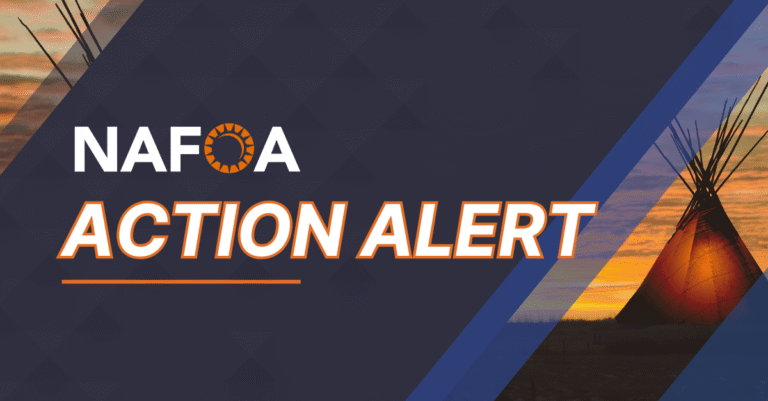

On Tuesday, August 6th at 2:00 p.m. Eastern Time, NAFOA will host the second part of the Tribal Tax Bill webinar series covering Sections 6,7, and 8 of H.R. 8318.
The first part of the series was held on July 23rd and covered Sections 3,4, and 5. The final webinar is scheduled for August 20th and will cover Sections 10, 11, 12, 13, and include an extended Q&A for the entire legislation.
This form will register you for the entire webinar series. If you cannot attend any of the live webinars, we encourage you to still register to receive the recording and presentation afterward. Webinar materials will typically be sent to registrants within 2-3 business days after the live session.
August 6th Webinar Topics:
Summaries of individual sections are from the Tribal Tax and Investment Reform’s Overview
Section 6: Improvement of Effectiveness of Tribal Child Support Enforcement Agencies by Parity of Access to the Federal Tax Refund Offset Program.
This section permits tribal child support enforcement agencies to enforce orders for support through withholding of past due child support obligations through federal income tax returns of parents with past 2 due obligations. Currently, only state child support collection agencies can access the offset program that authorizes the Department of the Treasury to withhold from tax refunds amounts owed for past due child support payments.
Section 7: Recognition of Indian Tribal Governments for Purposes of Determining Under the Adoption Tax Credit Whether a Child Has Special Needs.
Tribal nations have jurisdiction over adoption proceedings involving their citizens. However, currently only states to designate children as “special needs” for purposes of claiming the adoption tax credit. A special needs determination automatically entitles adopting parents to the maximum amount of the credit, irrespective of the actual expenses incurred. This section would permit adopting parents to receive an Adoption Tax Credit when a tribal court makes a determination that a child has “special needs.” Adoptions of children with special needs generally means children who are considered difficult to place for adoption.
Section 8: Creation of New Markets Tax Credit for tribal statistical areas.
This section creates an annual $175 million New Markets Tax Credit for low-income Tribal communities and for projects that serve or employ Tribe members. NMTC Program attracts private capital to economically distressed communities by providing tax credits to investors. This section addresses the low rate of NMTC deployment in Indian Country through a credit set-aside.
Section 9: Increased effectiveness of Tribal Low-Income Housing Tax Credits (LIHTC) in Indian Country.
The LIHTC program provides tax incentives to developers to create affordable housing, but credits are often unavailable to tribes. This section modifies the definition of difficult development area to include an Indian area for the purposes of determining eligible basis thereby explicitly including Tribes in the LIHTC program criteria.
For any other questions or concerns, please contact Nicholas Lovesee, Director of Policy, at nicholas@nafoa.org



